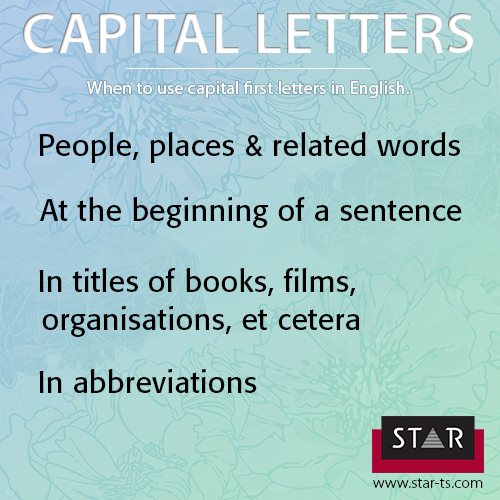Capitalization in English
Let’s face it, it can be a tad confusing when it comes to whether a word receives a capital first letter or not. However, there is a general rule of thumb to consider if the first letter of a word is to be capitalized: uniqueness! That is, for instance, if you have word such as Web (short for the World Wide Wide), then Web receives a capital W. There’s only one Web.
Just allowing uniqueness as a prerequisite to capitalization doesn’t seem correct, though. You have probably seen many words with capital first letters without any of them being distinctive. Here are the top four rules to adhere to to know when to capitalize:
- At the beginning of a sentence
- As with all western languages, the first letter of the first word in a sentence typically starts with a capital letter
- People, places and other related words
- People’s names tend to be unique even though many people can share the same name
- E.g. “Matthew had travelled the world in search of fine foods. He found Indian food most pleasurable“
- Titles of books, magazines, films, organizations, special days etc.
- Use a capital first letter when writing / typing the titles / names of organizations, plays, films, holidays, books, publications and so on. However, do not capitalize connecting words such as a, an, the, of, in et cetera — only the main words
- E.g. Smithsonian Institution
- E.g. The Cabin in the Woods
- Every first letter of an abbreviated word should be a capital
- EEA (European Economic Area)
- IAU (International Astronomical Union)
- MEP (a Member of the European Parliament)
| Unique Word | Related Word |
|---|---|
| Cambodia | Cambodian |
| Dada | Dadaism |
| Pantagruel | Pantagruelian |
| Europe | European |
Remember to use capital first letters in formal writing. It’s easy to forget nowadays since email and text messaging encourages the use of informal writing.

